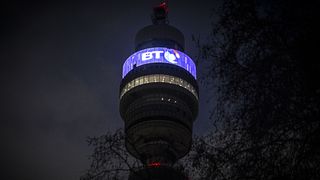BT steps forward to guarantee 10Mbps broadband coverage by 2020
For 99% of the UK, meaning there’s no need for a government USO

BT has said that rather than the government having to implement a universal service obligation (USO) to enable consumers to demand usable broadband speeds, the company itself will roll out broadband infrastructure to 99% of the UK guaranteeing a speed of at least 10Mbps by 2020.
The idea of the USO was for the government to give folks in more troubled or remote broadband areas which don’t receive a speed of at least 10Mbps the ability to request a line capable of this minimum level of performance, and now BT is essentially saying ‘don’t worry about this, we’ll do it off our own bat starting now’.
BT’s proposal is to invest some £600 million in expanding broadband infrastructure to 99% of the UK as mentioned, with the idea to make the 10Mbps speed universal across the entire country by 2022.
That’s obviously welcome news for those struggling with pitiful download speeds, which still blight a number of areas in the UK as we’ve seen recently (a consumer watchdog report from last month highlighted the fact that there are 11 regions across the UK which fall short of an average broadband speed of 10Mbps).
Of course, there are those who argue that the minimum target should be more than 10Mbps, and that this won’t be sufficient particularly when it comes to the next decade. But that’s a whole other story…
The next step for the government is to consider BT’s offer and whether it can simply dump the idea of a USO as unnecessary.
Warm welcome
As the BBC reports, Karen Bradley, Culture Secretary, commented: "We warmly welcome BT's offer and now will look at whether this or a regulatory approach works better for homes and businesses. Whichever of the two approaches we go with in the end, the driving force behind our decision-making will be making sure we get the best deal for consumers."
Are you a pro? Subscribe to our newsletter
Sign up to the TechRadar Pro newsletter to get all the top news, opinion, features and guidance your business needs to succeed!
BT reckons that 99% of the UK will have their 10Mbps broadband delivered (largely by Openreach) via fibre or fixed wireless solutions, although a small number – less than 1% – of truly out-in-the-sticks customers would get broadband via satellite. These are presumably the areas where it’s just economically unfeasible to run fixed broadband infrastructure.
In a press statement, the government noted: “The BT proposal would mean many premises will receive substantially more than 10Mbps – homes and businesses are also expected receive connections more quickly than could be delivered under a regulatory approach [i.e. USO].”
So it sounds likely that this will be the chosen route, although nothing’s for certain at this point. BT and the government will be discussing the proposal over the coming months, and if accepted, it will be a legally binding affair for the telecoms giant to meet these targets.
- These are the best broadband deals currently available
Darren is a freelancer writing news and features for TechRadar (and occasionally T3) across a broad range of computing topics including CPUs, GPUs, various other hardware, VPNs, antivirus and more. He has written about tech for the best part of three decades, and writes books in his spare time (his debut novel - 'I Know What You Did Last Supper' - was published by Hachette UK in 2013).
